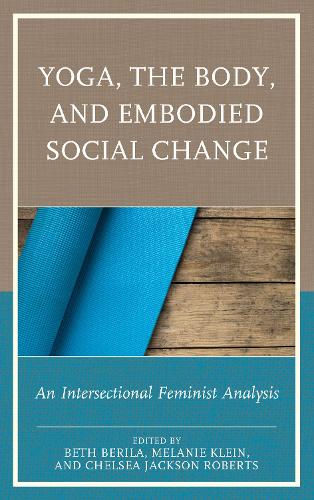
Yoga, the Body, and Embodied Social Change: An Intersectional Feminist Analysis
(Hardback)
Publishing Details
Yoga, the Body, and Embodied Social Change: An Intersectional Feminist Analysis
By (Author) Beth Berila
Edited by Melanie Klein
Edited by Chelsea Jackson Roberts
Contributions by Ariane M. Balizet
Contributions by Jacoby Ballard
Contributions by Diana York Blaine
Contributions by Mary Bunn
Contributions by Beth S. Catlett
Contributions by Kimberly Dark
Contributions by Lauren Eckstrom
Bloomsbury Publishing PLC
Lexington Books
9th September 2016
United States
Classifications
Tertiary Education
Non Fiction
Feminism and feminist theory
306.4613
Physical Properties
Hardback
356
Width 157mm, Height 238mm, Spine 31mm
712g
Description
Yoga, the Body, and Embodied Social Change is the first collection to gather together prominent scholars on yoga and the body. Using an intersectional lens, the essays examine yoga in the United States as a complex cultural phenomenon that reveals racial, economic, gendered, and sexual politics of the body. From discussions of the stereotypical yoga body to analyses of pivotal court cases, Yoga, the Body, and Embodied Social Change examines the sociopolitical tensions of contemporary yoga. Because so many yogic spaces reflect the oppressive nature of many other public spheres, the essays in this collection also examine what needs to change in order for yoga to truly live up to its liberatory potential, from the blogosphere around Black womens health to the creation of queer and trans yoga classes to the healing potential of yoga for people living with chronic illness or trauma. While many of these conversations are emerging in the broader public sphere, few have made their way into academic scholarship. This book changes all that. The essays in this anthology interrogate yoga as it is portrayed in the media, yoga spaces, and yoga as it is integrated in education, the law, and concepts of health to examine who is included and who is excluded from yoga in the West. The result is a thoughtful analysis of the possibilities and the limitations of yoga for feminist social transformation.
Reviews
Yoga, the Body, and Embodied Social Change invites us into a vibrant conversation about what yoga as a practice of freedom might look like. Drawing on rich narratives and research about yogas transnational history, this volume protests attempts to strip mine yoga, to reduce it to a windowless commodity. The book is essential reading for yogis, activists, and scholars who do not want to reinforce white supremacy and other exclusions. A celebration of a vital grassroots movement that honors the human body in all its manifestations, this book illuminates yoga as an act of resistance, a way of creating justice in our many communities. -- Becky Thompson, Simmons College
This is an exciting and unique collection exploring feminist literature on yoga, body politics, mindfulness, and social justice. Berila, Klein, and Roberts bring together an impressively diverse and interdisciplinary array of authorsfrom academic fields such as Africana Studies, anthropology, education, English, health sciences, history, justice and social inquiry, political science, sociology, sports studies, and Womens & Gender Studies, as well as craniosacral therapists, meditation and yoga instructors, and activiststo critically explore the gendered, racialized, and queer politics of yoga. Authors emphasize the liberatory potential of yoga, particularly for marginalized groups. It will be useful not only for feminist teachers and scholars, but also social justice activists and yogis. -- Christa Craven, The College of Wooster
Author Bio
Beth Berila is professor of ethnic and womens studies at St. Cloud State University. Melanie Klein is an associate professor of sociology and womens studies at Santa Monica College. Chelsea Jackson Roberts is founder and director of yoga, literature, and art at Spelman College.
